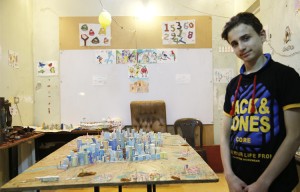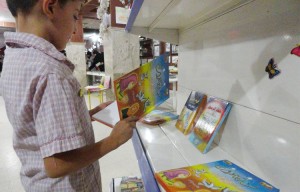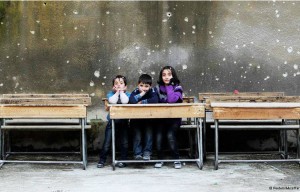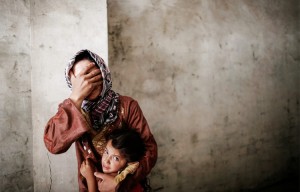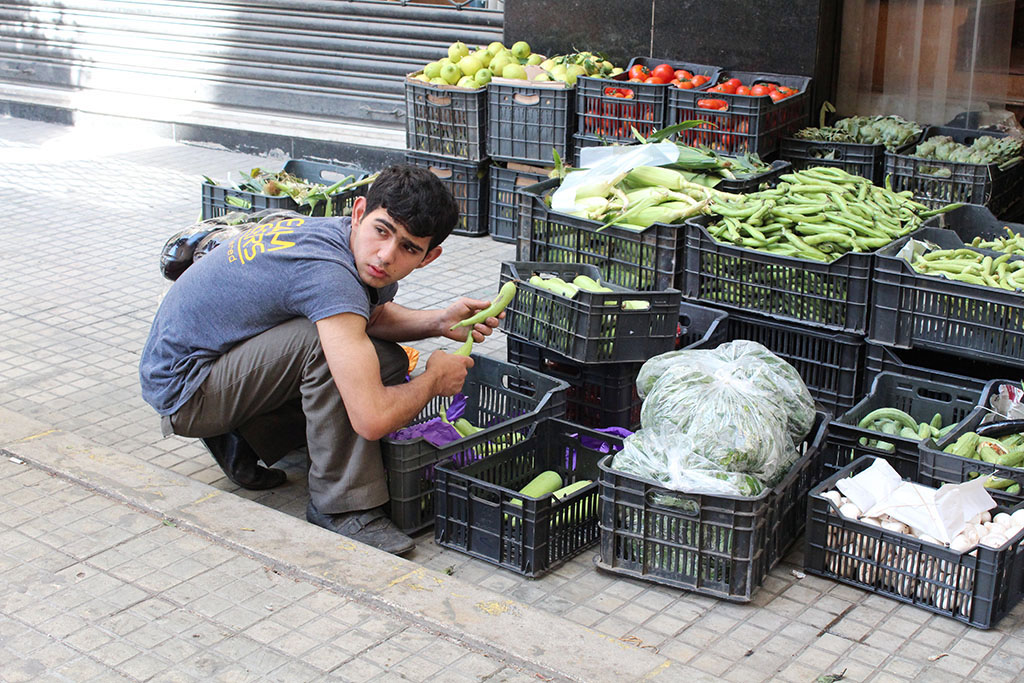
Syrian Revolution Burdens Syrian Children

Enab Baladi Issue # 89 – Sun, Nov. 03, 2013
As the living conditions of most Syrian families deteriorate due to the soaring prices and the loss of the family’s bread-winner being killed, detained or injured, many families were forced to push their own children to work to make ends meet, placing on them heavier responsibilities than they should have, let alone depriving them of their basic rights in most cases.
Enab Baladi made a tour in Al Tal in Damascus Suburbs, which is crowded by its native inhabitants and multitudes of displaced people from nearby areas. Throughout the tour Enab Baladi observed several working kids and interviewed some of them.
Ten-year-old Amer is a native inhabitant of the city; he works in the main market of the city on a street cart owned by his father. Amer’s work starts at 10 in the morning and ends according to security situation and to the selling and buying movement in the market.
Amer, who claimed to be attending school –in contrary to what we have observed throughout several days-, appeared unduly anxious of his father, who was sitting nearby with neighboring shop owners. Amer’s father severely scolds his son whenever he steps away from the cart, does not pay attention to his five-year-old sister who usually accompanies them to work, or does not respond to customers right way.
Muhannad is another working child; he is a displaced person from an area he preferred not to disclose. About a year ago, Muhannad started working on a street shop selling clothes to help his father with the family’s expenses. He had to drop out of school last year following their displacement, yet he expressed particular eagerness to go back to school. Fourteen-year-old Muhannad says -as he draws an assuring smile on his face- he is determined to apply for next year’s middle school certification exams with other “Free Students”.
Sumaia, a fifth-grade student, and her brother Bahaa, a first-grade student sell stationeries and toys on a street cart placed at the entrance of their neighbourhood. The siblings had to work after their father was injured in the leg and thus became unable to work. Their mother buys, usually on credit, supplies for the cart from the capital, Damascus. Sumaia and Bahaa work all day to earn the family’s daily bread, supporting their parents, an older sister, two younger brothers and themselves.
The siblings use a pushcart to move goods from the house to the street cart after school, and vise- versa at the evening every day; they take turns in moving goods while the other kid keeps an eye on the street cart.
During the day, Sumaia helps her little brother with his homework and finishes hers; also they buy groceries and other supplies for the house following their mother’s instructions.
We asked sumaia about their own stationeries, whether they use the same kind she sells or they buy a different trademark; Sumaia answered that they take care of their stuff and they still have last-year stationeries, as for the school backpacks they received them from the UNICEF. The siblings are trying to save money to buy the notebooks Sumaia needs and the pencils her elder sister –in the seventh grade- needs.
Muhammad seemed the luckiest of the kids we have met. He goes to school every morning, then he comes back to home to bring his mother the needed supplies for the house and to get a sandwich “condensed yogurt or Thyme.. whatever is available”. Muhammad then heads to his father’s nearby sweets’ cart to “take weight off his shoulders”. Muhammad studies at night in his home; occasionally when he has a lot of studying or during exams he brings his books to study during work.
Muhammad’s father seemed understanding; he invites his kid’s friends as they pass near the cart and passes out sweets to them. He allows Muhammad to spend some time with them as well; he also helps him with his studying.
Some people think it’s an ample opportunity to build and strengthen the child’s character through placing such responsibility on him\her; however, that is drastically wrong. The psychiatric specialist Hushiar Othman explained how a normal growth process requires a balance between the actual age of the child (Chronological Age), his\her mental abilities and his\her social behaviour; any disruption of that balance will –definitely- cause a character disorder. Placing heavier responsibilities than a child can take would develop social behaviour that is inappropriate for his\her chronological age, thus depriving him\her from the innocence, purity and spontaneity of childhood. The specialist pointed that a person’s character (personality) is mainly developed during childhood; consequently, depriving someone from their basic rights of playing, learning, being properly taken care of, and meeting other children, in addition to burden the child with heavy responsibilities will definitely lead to behavioural disorders. Child labour deprives, completely or partly, a child of these rights thus the child will exhibit violent authoritarian behaviour, and a substructure personality. In this case the child will also display tendencies towards arrogance and exploitation of others; this child will be later a resentful person towards his\her community for neglecting them during childhood and a disobedient individual who negatively affects people around.
Syrian Kids today are the responsibility of each and every one. They present the main component of the new Syria; they have already shown remarkable endurance and ability to adapt despite the severe trauma they have experienced. Yet, this is no excuse for us to burden them with further hardships that will only affect them both now, during childhood, and later, throughout their lives.
اذا كنت تعتقد/تعتقدين أن المقال يحوي معلومات خاطئة أو لديك تفاصيل إضافية أرسل/أرسلي تصحيحًا
إذا كنت تعتقد/تعتقدين أن المقال ينتهك أيًا من المبادئ الأخلاقية أو المعايير المهنية قدم/قدمي شكوى
-
تابعنا على :




